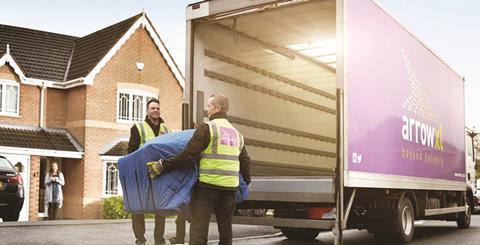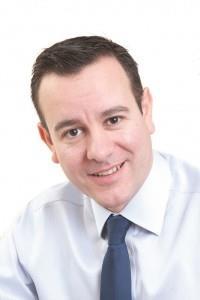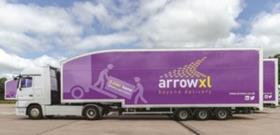
Arrow XL split from Yodel in 2013, and in the last two years chief executive Ian Howell has built a two-man delivery firm that prides itself on giving all of its customers the VIP treatment.
You could be forgiven for thinking of two-man delivery as the awkward cousin of the more glamorous parcels sector.
But Arrow XL chief executive Ian Howell has spent the first two years in the role giving the business the VIP treatment.
New technology and a premium VIP service are just some of the ways in which Howell has spent the beginning of his career at Arrow making his customers feel special.
The business rebranded from Yodel XL in April 2013, and Howell joined the company as chief executive in October of that year. His time in the job, along with the rebrand, have been incredibly positive thus far, he tells MT.
“I’m probably one of the luckiest guys alive. I work for a great business. It’s two years, and it has gone incredibly quickly, and the re-branding of the business has been positive.”
“Because of what we deliver, we’re going into a customer’s home, and therefore we need to be respectful of entering their space and make sure they feel comfortable.
Steering Arrow away from its Yodel roots, he believes, was the right move for the company. “Yodel and Arrow needed to separate because we operate in different markets,” he says. “Having everything under the Yodel umbrella was confusing for clients and consumers. Yodel do parcels, we do big, heavy, bulky items. Giving us our own identity was absolutely the right thing to do.
“We made a conscious and deliberate decision to allow both businesses to really focus on their own core operations,” he adds.
Where to aim?
The two businesses now operate independently of one another, with separate boards, fleets, staff bodies and networks, although Arrow XL, and its subsidiary Arrow XL (Scotland) remain sister companies to Yodel.
And while it is yet to buy its own truck fleet, last year saw Arrow buy 19 new double-deck Cartwright trailers that conduct inter-hub movements on a daily basis. “They’ve been a huge success,” says Howell. “It’s great to see the Arrow XL livery on them. They’re very big and very purple.”

Arrow XL’s own infrastructure now consists of four central hubs and 23 satellite locations, with its delivery duos servicing 98% of UK postcode areas six days a week.
Since joining the business, Howell says his main focus and most significant challenge has been remoulding the culture of Arrow XL’s business, both on-site and on delivery routes.
He says: “When I joined the business, we had a set of well-defined values, and our colleagues lived by them. But what we didn’t have, as business, was a purpose. We didn’t have a vision. So changing the culture has undoubtedly been our biggest challenge, but it’s been our biggest success. I’m really proud of what we’ve done.”
Howell says the company defined its purpose as “making customers’ lives easier by delivering the right product on the right day and in the right condition”, but that this has since evolved.
“It’s not that it’s not important, but the more we have listened to the consumer, the more we have realised it’s actually about the way you make the customer feel. It’s about the interaction of the delivery crew and the customer, and our customers are typically excited about how we have made them feel.”
Howell says his crew putting customers at ease is crucial to the nature of the operation. “Because of what we deliver, we’re going into a customer’s home, and therefore we need to be respectful of entering their space and make sure they feel comfortable.”
Having dedicated Arrow XL employees, rather than subcontracted staff, plays a key role in realising this vision, according to Howell.
“Actually, a lot of our competitors will operate the hub, and the final-mile deliveries are undertaken by service partners and owner-drivers. That is more challenging for their crews to really live the brand values, whereas ours, they are our crews, they are our employees.”
“As a business, we want to be famous for delivering great service, and having our own crew means we can invest the time and energy in them to train them to a standard.”
The training that will matter the most, he continues, is about the softer skills.
“It’s not the technical skills of how to handle something so big and bulky. How do I get it through the front door? It’s more about how we empathise with the customer, deliver a great service, or diffuse a situation? This, I think, is where we become unique as a business.”
Employee training
Every year, each Arrow XL employee undertakes training under the company’s Pide mantra (personal responsibility in delivering excellence). “We run the Pride academy every year,” says Howell (pictured right). “Everybody in the business, irrespective of their role, attends, myself included. It’s a journey of engagement to ensure our crews understand how customer’s demands and expectations have changed over time. In the modern era, we are typically more cash rich and time poor. We want things when we want them, and need to know when they’re coming.”
Every employee attends a minimum of one day a year, with other modules available and the potential to earn an NVQ in customer service.
“Retailers and e-retailers sell their products seven days a week, so why shouldn’t we sell ours? That’s where the future needs to be
The newest addition to Arrow’s drive for total customer satisfaction is its VIP service. For a premium rate, the service will see drivers unpacking and installing goods after delivery. “We even roll out a red carpet, to protect the customer’s carpet, but also because it’s about the experience and making the customer feel important.”
The other half of Howell’s strategy is to “anticipate changes in consumer behaviour, to anticipate what they’re going to want next”. This has lead to significant investments in technology in the last year.
But this is limited to upgrading its delivery operation, as the sector itself is restricted in what it can automate at its hubs.
“If you come and look at our sites, we are the opposite of someone like DPD. Because everything’s big, and heavy, we can’t have automation,” says Howell.
Special customers
What Arrow has done is replace all of the handheld terminals its drivers take on delivery rounds to improve the operation’s visibility – all part of Howell’s plan to make the customer feel special and involved in the delivery process.
The new technology has facilitated the launch of a live tracking app for its customers.

“We’ve reduced the delivery window from four hours to two, which then narrows down to a 30-minute window closer to the delivery time. The app uses Google technology so if the traffic’s bad, customers can see what number their delivery is and what number the guys are currently doing.”
Additionally, if the customer phones the driver, the system displays the customer’s name and delivery information to enable a more personal interaction from the start.
Giving its customers as much information as possible is beneficial in other ways too, says Howell. “Clearly, we want the consumer to be at home when we turn up. We don’t want to have to take the goods away. The more you touch a product, the more susceptible it is to damage.”
Far from weighing down the balance sheet, the investment in technology is to thank for Arrow XL turning its first profit last year, he adds. In the year ending 30 June 2014 Arrow XL made a loss of £668,000, but Howell says 2015 saw the company turn a profit, and that it will remain profitable in 2015/16.
“We are a profitable business and we will increase profit as we continue to invest in technology. We are a good, sustainable business,” he says.
So what’s next for Arrow XL? Howell says: “I’d like to secure our position as the industry’s leading two-man fulfilment partner. We’re on a journey and the market needs to know who we are and what we’re all about.”
Howell adds that he’d also like to use the four warehouses on its hub sites to a greater extent. “We need to work on how we utilise our infrastructure. We have four big warehouses and that’s where we can be a bit different.”
Allowing customers to choose their own delivery slots and Sunday deliveries are also on the horizon, Howell says.
“Retailers and e-retailers sell their products seven days a week, so why shouldn’t we sell ours? That’s where the future needs to be, and there are actually a lot of benefits running your operation over seven days a week can have in terms of optimising infrastructure.”
Success story
But after two years on the job, Howell is satisfied with Arrow XL’s progress, crediting his team with its successes. “I think the successes in the business over the past two years have been down to the quality of my team. I’m fortunate to work with a great board, and I believe we have a phenomenal team of people driving the business forward. “It’s been a wonderful two years and I’m looking forward to the next two. We’ve been a success story and we want to continue to drive this.”













